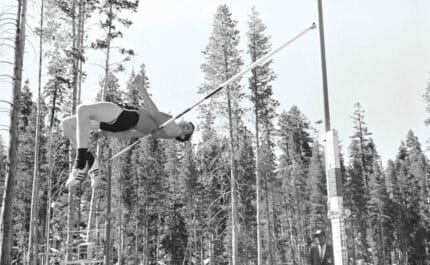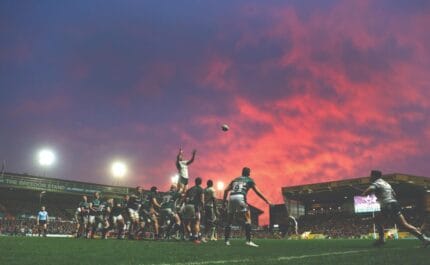The first days of war: The exiled journalist
On 24th February Russian tanks rolled into Ukraine, unleashing a new European conflict that would swiftly destroy large swathes of the country and leave thousands dead. This story is taken from our series on the first days of the Ukraine conflict

Tikhon Dzyadko working at TV Rain’s studios in Moscow. Photo: TV Rain
24th Feb 2022
We spoke to several people from Ukraine and Russia whose lives were thrown into disarray by the outbreak of war. This article is one of several pieces on the first days of the Ukraine conflict we published in issue 46 of Delayed Gratification, which can be purchased at our online shop.
The exiled journalist
Tikhon Dzyadko on the perils of reporting on the war in Russia
When Vladimir Putin announced the start of Russia’s “special military operation” in a pre-dawn speech on 24th February, Tikhon Dzyadko was in a taxi travelling to the TV Rain studio in Moscow. He recalls finding his colleagues “in shock, devastated, with many people crying” – but as the editor-in-chief of Russia’s only remaining independent news channel he had an important job to do. His morning show that day, which began an hour and a half early due to the enormity of the breaking news, would be one of his final broadcasts from Russia – within a week he had fled the country and the station had been shut down. “On that first day I realised that it was the beginning of the end,” he says.
The Russian government had been applying pressure on TV Rain, also known as Dozhd, for several years – in 2014, Dzyadko says, it was cut off from satellite and cable networks and advertisers were prohibited from spending money with the network. The station survived by moving to YouTube and other platforms and attracting around 70,000 paying subscribers. Last year the government tried to smear and stigmatise the station by designating it and its journalists as ‘foreign agents’. “But none of those [pressures] compared with this last, this final pressure,” says Dzyadko.
The Russian government decided that it doesn’t even want to pretend to be a democracy any more”
Dzyadko says that during the first week of the war TV Rain attracted around 25 million viewers a day on YouTube, where it exposed the Russian government’s lies on Ukraine. “It was obvious to me that the government was not going to tolerate so many people hearing real information, as well as information from the Ukrainian side,” he says. “The fact that we managed to survive [for so long] was because the Russian government was pretending to be a democracy, a broken democracy but still a democracy,” Dzyadko adds. “But with the beginning of the war, the government decided that it doesn’t even want to pretend to be a democracy any more.”
Over the first few days of the conflict the pressure on TV Rain intensified. Its website was blocked after it was found guilty of calling the war ‘a war’ and the staff received warnings of a police raid. “That [raid] never happened,” says Dzyadko. “But me and my wife [TV Rain news director Ekaterina Kotrikadze] had started to receive threats by phone and text message and the atmosphere in Moscow was very nervous. Our staff were getting signals from sources in the government that TV Rain journalists were about to be arrested. When [on 28th February] a new law was proposed [which introduced a maximum sentence of] 15 years in prison to journalists who spread ‘fake news’ about Russia’s military in Ukraine we realised that we were the first in line to be prosecuted. That’s when we decided to leave Russia.”
Dzyadko and his family packed their bags and quickly left for Istanbul, where they stayed for a few days before heading to Georgia, where Kotrikadze originally comes from. While they were in Turkey, the ‘fake news’ law was passed. The message from the government seemed clear – stop what you’re doing or face jail. TV Rain succumbed to the inevitable and pulled the plug. In the final moments before they went off air, the TV Rain staff who were still in Moscow gathered around the news desk, called for an end to war, and walked out as the broadcast continued to roll, leaving the set eerily empty. The screen then switched to a performance of Tchaikovsky’s Swan Lake, a reference to Russian history familiar to many viewers. In 1991, as the Soviet Union collapsed, state TV had played the ballet on a constant loop.
Most of the TV Rain staff fled the country soon afterwards, and when Dzyadko and Kotrikadze reached Tbilisi they got straight to work. In the first episode of the Kotrikadze Dzyadko talk show, which launched on YouTube on 22nd March with the help of TV Rain colleagues who had also left for the Georgian capital, the couple wore blue and yellow outfits to match the Ukrainian flag. By the middle of June they had 200,000 subscribers. “There is a huge demand for independent information in Russia,” Dzyadko says.
Later in March Dzyadko got a huge scoop when he was one of four Russian journalists to interview Volodymyr Zelensky over Zoom. For the Ukrainian president it was an opportunity to address a Russian audience directly in his mother tongue. “Of course a Zoom interview is different to sitting down next to the person but it was still very important,” says Dzyadko. By talking about the bodies – both Russian and Ukrainian – piling up in cities such as Mariupol, Zelensky broached topics considered off-limits on Russian state TV coverage. “Although I would not use the words ‘TV coverage’,” Dzyadko insists. “I would say ‘propaganda coverage’ because there is only one side, the Russian side. They don’t get information on civilian victims, they don’t get information on Russian military deaths, they are just doing what they are told, saying the ‘special military operation’ is going well and that any civilian deaths are caused by Ukrainian neo-Nazis. They are just spreading lies.”
Dzyadko tells me that while many Russians believe the Kremlin’s distorted picture of what’s happening in Ukraine, or are in denial because they find it hard to accept that their government and military could do such terrible things, many others are able to access independent news sources through YouTube and Telegram, and use virtual private networks (VPNs) to access blocked websites.
He says that he’s planning to relaunch TV Rain as a Russian news channel in exile, but he’s nervous about whether it will work. “We will face a lot of challenges,” he says. “One is how to get information [out of] Russia. The second big challenge is how to get information into Russia. All my life I was very sceptical about [the idea of] media in exile, but unfortunately we have to face the reality of the situation. It’s the only option we have, so we’re going to try.”
Dzyadko has no idea how this war will end. He is certain, however, that independent journalism in Russia is now dead. One day, he says, he hopes that he will be able to return to Russia with his family. “But I cannot imagine going back while Putin is still president.”
Slow Journalism in your inbox, plus infographics, offers and more: sign up for the free DG newsletter. Sign me up
Thanks for signing up.








